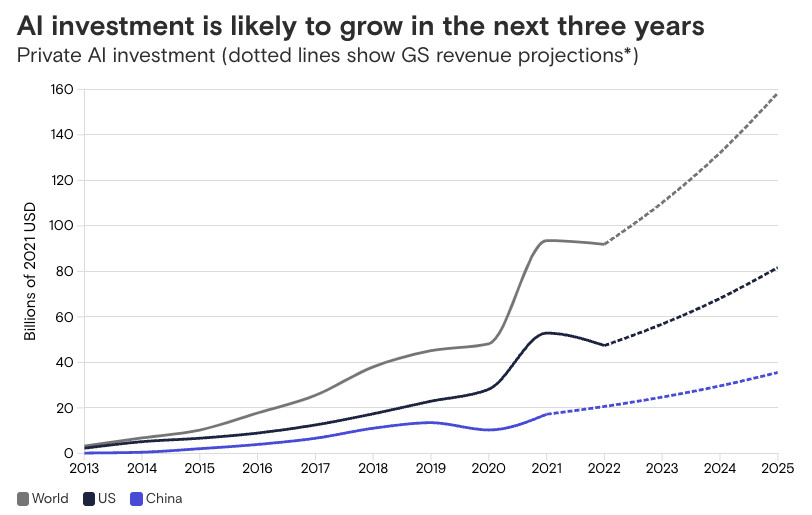The AI Revolution: A Bigger Economic Catalyst Than Electricity?

Imagine a world where artificial intelligence (AI) fuels economic growth at a scale greater than electricity and personal computers combined. Sounds futuristic, right? Well, according to economists at Goldman Sachs, this future may arrive sooner than we think. With AI investment projected to skyrocket, the impact on the U.S. economy could be game-changing.
AI Investments Poised to Hit $200 Billion by 2025
In an August 1 report from Goldman Sachs, economists Joseph Briggs and Devesh Kodnani forecast that AI investments could soar to $200 billion globally by 2025—with half of that concentrated in the United States. Their analysis suggests that AI-driven advancements could contribute up to 4% of U.S. GDP growth, compared to the 2% growth seen during past tech booms driven by electricity and personal computers.

Projected AI investment growth globally and in the U.S., China over the next three years. Source: Goldman Sachs
The Driving Force: Generative AI
So, what’s fueling this explosive investment wave? The answer lies in generative AI, a technology that’s already reshaping industries. If you’ve ever played around with ChatGPT or admired stunning AI-generated artwork via Midjourney, then you’ve experienced its potential firsthand.
According to the report, generative AI is expected to boost global labor productivity by over 1% annually for the next decade. That’s huge! But there’s a catch—companies need to invest heavily in infrastructure, digital systems, and workforce training to fully harness these gains.
“For large-scale transformation to happen, businesses will need to make significant upfront investment in physical, digital, and human capital to acquire and implement new technologies and reshape business processes.”
The U.S.: Leading the AI Race
One of the more fascinating takeaways from the research is that 16% of Russell 3000 companies cited AI in their earnings calls—up from less than 1% in 2016. That’s a massive leap! This trend indicates that U.S. businesses are not just talking about AI; they’re actively integrating it into their strategies.
“The U.S., meanwhile, is positioned as the market leader in AI technology, and American companies will likely be relatively early adopters.”
While predicting the exact timeline of the AI investment cycle is tricky, business surveys suggest that AI’s most significant economic impact will really start kicking in post-2025.
The Future of AI and the Economy
AI isn’t just a buzzword—it’s a transformational force that could reshape entire industries and redefine the global economy. But as with any revolutionary technology, businesses and policymakers must navigate the balance between innovation and investment.
The AI boom is coming—are we ready?
Related: ChatGPT’s capabilities are getting worse with age, new study claims
📌 Want to own a piece of history? Collect this article as an NFT and support independent journalism in the AI space!

